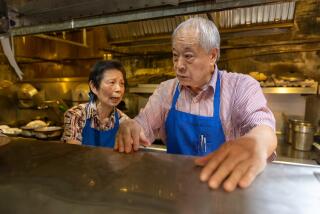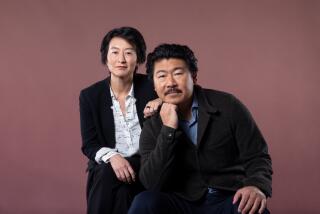Writer Frank Ching’s Epic Journey of Self-Discovery
- Share via
NEW YORK — Frank Ching shed no tears when his father died. Old beyond his 71 years, Qin Liankui was quarrelsome and cantankerous, convinced that his life was no longer useful and that everyone around him, even Frank, his youngest child by the last of his three marriages, was plotting to kill him.
Lonely and resentful, 18-year-old Ching (whose name, with its final “g,” follows the pronunciation of the family’s Shanghai dialect; Qin, pronounced “chin”) was unaware that the father--who had exiled his family to a dark, rat-infested apartment in Hong Kong, then blacked out the windows to keep imaginary enemies from discovering him--was actually one of the architects of China’s constitution. His father was a prominent Shanghai lawyer who in 1949 chose poverty and exile over endorsing either the Kuomintang of Chiang Kai-shek or the Communist Party of Mao Tse-tung.
All young Frank knew for sure was that when he played with flashlights in the gloomy apartment, his father thought he was signaling enemies to set off poison gas. He had only managed to survive, the father told the son, because he sat up with an orange to his nose to act as a gas mask.
His father’s eccentricities meant that Ching had been raised in isolation from a large and important family in Shanghai. In part because the marriage of his parents, distant relatives, was shrouded in scandal, Ching knew nothing of his ancestry. He felt cut off, alienated, uncertain even of how many brothers and sisters he really had. In the context of a culture where one of the worst insults one Chinese can hurl at another is that he has wang ben , or forgotten his origins, the feelings were particularly bitter.
So at his father’s funeral, Ching remembers thinking, “Well, good riddance.”
But at that otherwise solemn event in 1959, Ching began to suspect that Qin Liankui might have been someone other than the contentious old man who fought constantly with his much, much younger wife.
“I was very impressed during the funeral that so many people had come, that there were so many wreaths,” Ching said over dinner here recently. “It was my first inkling that he was a distinguished figure.”
It was also the beginning of an epic journey of self-discovery that culminated with the publication this spring of Ching’s book, “Ancestors: 900 Years in the Life of a Chinese Family” (William Morrow & Co.: $22.95).
Ching’s search taught him more about himself than he ever learned in the psychoanalysis he underwent as a student, and later as a young journalist in New York. Equally important, in Ching’s view, in tracing his origins back to a poet and scholar named Qin Guan, born in 1049, he pieced together a large chunk of Chinese history.
“The value of the book is not so much in what I uncovered about myself as in the fact that this is a different way of looking at history, at Chinese history in particular,” Ching said.
“I think it helps people understand China better,” he said. For to understand China today, Ching said, “you have to understand China yesterday.”
Aided by Politics
Ching’s quest was aided by politics, as the gradual thaw in U.S.-China relations permitted him to return to the country he had left at age 5. He first revisited China in 1973, as a 32-year-old journalist with the New York Times. By 1978, as a reporter in Hong Kong for the Asian Wall Street Journal, Ching was making frequent trips both to mainland China and to Taiwan, where some of his family was living.
It was on one such trip in late 1978 that Ching experienced the revelation that would be his breakthrough to his astonishing family history. Ching was visiting with his half-sister Margaret, 22 years his senior and one of the siblings left behind in Shanghai, when suddenly she produced a plastic bag stuffed with dust-covered books.
“Here,” she said, thrusting the package at Ching. “I’ve kept these long enough. It’s time they went to a son.”
Inside were two volumes of official documents of the Chinese republican government that showed his father’s name and photograph as a member of the National Assembly. The third book was much older, bound in thread and printed on thin rice paper. Its title, in ancient Chinese script, read “Ancestral Genealogy of the Qin Clan of Wuxi.”
There in his hand was the history of 33 generations on his father’s side, 34 generations on his mother’s. Only the most prominent and well-established of Chinese families had maintained such zong pu , clan records.
Four years and a mountain range of research later, Ching, his sister Alice and Jiaju, their father’s oldest son, bent over a single slab in Wuxi and touched the gravestone of the Song dynasty poet from whom the three descended.
Ching’s description of the experience on the front page of the Wall Street Journal brought renewed attention to Qin Guan, a traditionalist poet who had died in disgrace, only to be rehabilitated once, then forgotten. Now, as the Chinese government restored the tomb and held seminars on his poetry, Qin Guan was rehabilitated again, this time by Communists.
“The irony,” Ching wrote, “would not have been lost on Qin Guan.”
Ching left China and his newspaper job in 1983, determined to turn his remarkable family story into a book that would also illustrate the history of China.
“I didn’t want to write another book about being a reporter in China,” Ching said.
‘Grew Up in a Vacuum’
Instead, Ching, the man who “grew up in a vacuum, not knowing anything about my family, nothing at all,” found relatives with a record of public service that spanned almost a millennium. He found brothers who served in communist labor camps, and a brother who died fighting as an underground Communist. That brother, now seen as a party martyr, wrote in 1941 that “today I am very happy because I sold my watch and bought a gun.”
What he did not find in the family history, certainly not in large numbers or extended detail, were women.
“I think Chinese have a respect for history, but not necessarily for facts,” he said. Women, Ching found, “existed for the sole purpose of making more men.”
Ching’s ancestors stayed alive by guile, by dint of their status as scholars and by carefully cultivated relationships with the country’s ruling clans. The fact that they were wealthy, Ching said, “helped a great deal, too.”
Somehow, the family escaped the down cycles, the phases of failure. “I don’t know,” Ching said when asked to explain his family’s record of success. “I would have to say that luck probably has a lot to do with it.”
Replete with poets, generals, policy-makers, educators, the family was of such status that it merited its own official family of grave-watchers, whose members were in turn buried near the Qin grave site. For Ching, that fact symbolized the single dominant quality about Chinese history and culture: its continuity.
“I didn’t realize that there had been a family hired to look after one grave for generation after generation,” Ching said. “And then it dawned on me, China had been so unchanged for so many years. The Communist Revolution did not change things in the countryside. It was the Cultural Revolution that changed things.”
Ching’s research gave him new insights into contemporary China as well.
“I think they are better motivated at this point,” he said. “I think people who are underprivileged tend to be overmotivated.”
But extending his eye to his adopted home country (for Ching, though he now lives in Hong Kong with his attorney-wife, Anna, is an American citizen), Ching said he feared the extraordinary success records of many Asians living in the United States would not be perpetuated.
“I think that American society will discover as time goes on that Asian-Americans will not perform up to the level of the present society,” Ching said. “They will become fat and lazy.
Wide Attention From Asians
“I don’t think it’s a cultural generalization that each generation will be as hard-working as its predecessor.”
To Ching’s amazement, his book has won wide attention from Asians, a group for whom he thought his family history would be of limited interest.
“I thought they would know about it,” Ching said. “I thought they wouldn’t need to read this book.
“What has surprised me,” he said, “is the number of Asians who have said that I am providing a role model for younger Asian-Americans, that I am helping to instill pride in them.”
With some facetiousness in his voice, Ching calls this turn of events “a terrible burden to have to bear, for one now has to make philosophical statements, just because one has spent a few years looking into the past.”
He shrugs off this burden by protesting that he is “only a barefoot historian, someone who was never trained in history,” but was simply “extremely fortunate.”
After all, Ching said, “if it turned out that I was descended from a long line of peasants, it would have been for nothing.”
More to Read
Sign up for Essential California
The most important California stories and recommendations in your inbox every morning.
You may occasionally receive promotional content from the Los Angeles Times.













